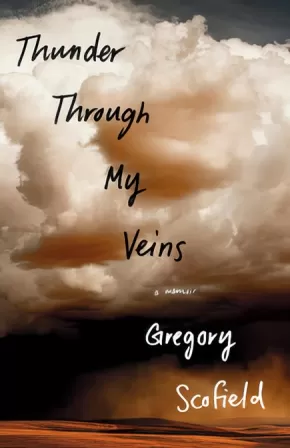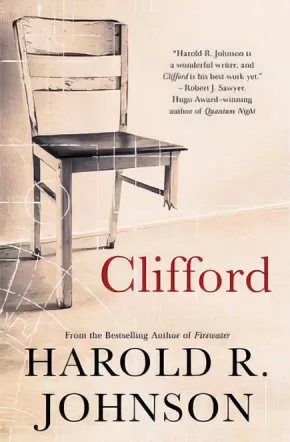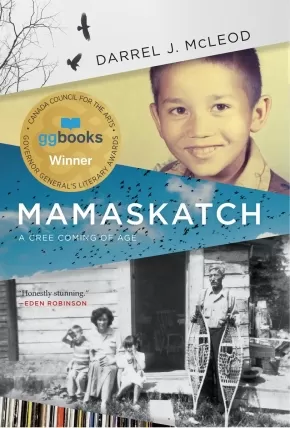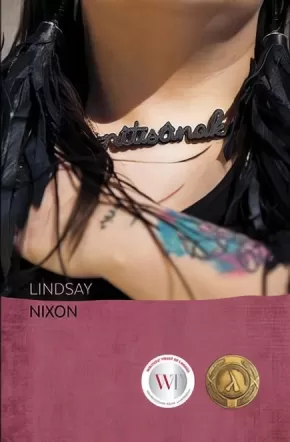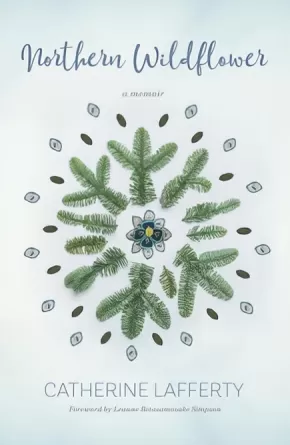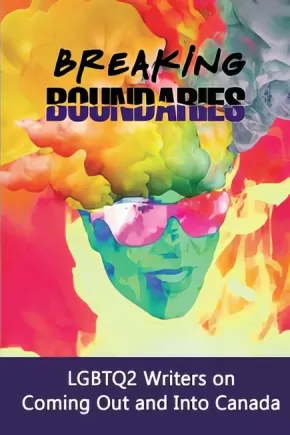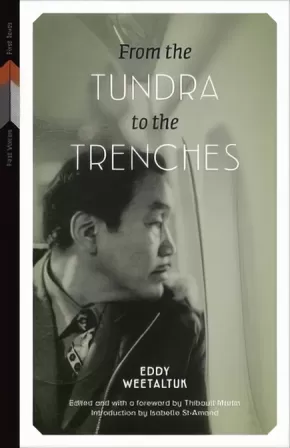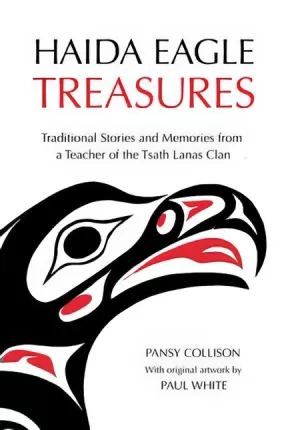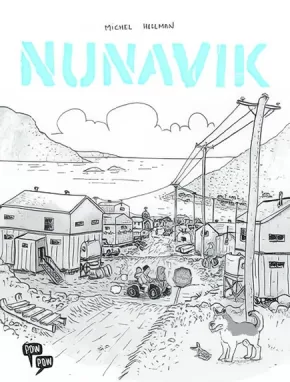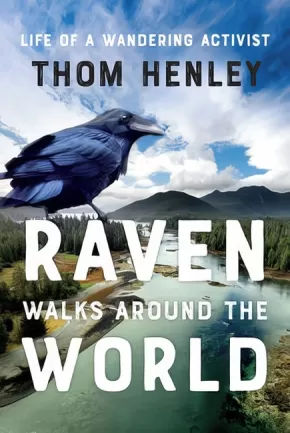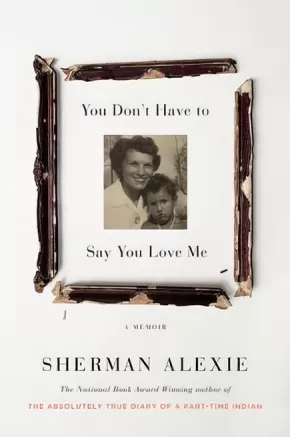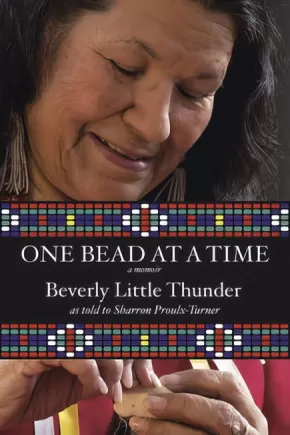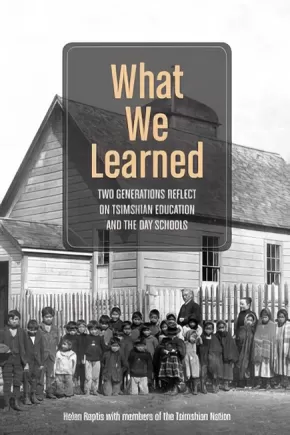
Memoir
91
-
105
of
117 Results;
Sort By
Go To
of 8
Thunder Through My Veins: A Memoir
$19.95
Format:
Paperback
Text Content Territories:
Indigenous Canadian; Métis;
Grade Levels: University/College;
ISBN / Barcode: 9780385692748
Synopsis:
Synopsis:
Gregory Scofield's Thunder Through My Veins is the heartbreakingly beautiful memoir of one man's journey toward self-discovery, acceptance, and the healing power of art.
Few people can justify a memoir at the age of thirty-three. Gregory Scofield is the exception, a young man who has inhabited several lives in the time most of us can manage only one. Born into a Métis family of Cree, Scottish, English and French descent but never told of his heritage, Gregory knew he was different. His father disappeared after he was born, and at five he was separated from his mother and sent to live with strangers and extended family. There began a childhood marked by constant loss, poverty, violence and self-hatred. Only his love for his sensitive but battered mother and his Aunty Georgina, a neighbor who befriended him, kept him alive.
It wasn't until he set out to search for his roots and began to chronicle his life in evocative, award-winning poetry, that he found himself released from the burdens of the past and able to draw upon the wisdom of those who went before him. Thunder Through My Veins is Gregory's traumatic, tender and hopeful story of his fight to rediscover and accept himself in the face of a heritage with diametrically opposed backgrounds.
Additional Information
256 pages | 5.18" x 8.00"
Clifford: A Memoir, A Fiction, A Fantasy, A Thought Experiment
$22.95
Format:
Paperback
Text Content Territories:
Indigenous Canadian; First Nations; Cree (Nehiyawak);
Grade Levels: 12; University/College;
ISBN / Barcode: 9781487004101
Synopsis:
Synopsis:
I open my eyes in the darkness, laying on my side, half my vision is of the earth and shadows; the other is of the sky, treetops, and stars. I should write Clifford’s story. The thought emerges fully formed . . . The thought dissipates. I close my eyes and the earth and the sky disappear. The warmth of my sleeping bag wraps around me and sleep pulls me under into that half-world where reality and fantasy mingle in a place where coherent thoughts disintegrate.
When Harold Johnson returns to his childhood home in a northern Saskatchewan Indigenous community for his brother Clifford’s funeral, the first thing his eyes fall on is a chair. It stands on three legs, the fourth broken off and missing. So begins a journey through the past, a retrieval of recollections that have too long sat dormant. Moving from the old family home to the log cabin, the garden, and finally settling deep in the forest surrounding the property, his mind circles back, shifting in time and space, weaving in and out of memories of his silent, powerful Swedish father; his formidable Cree mother, an expert trapper and a source of great strength; and his brother Clifford, a precocious young boy who is drawn to the mysterious workings of the universe.
As the night unfolds, memories of Clifford surface in Harold’s mind’s eye: teaching his younger brother how to tie his shoelaces; jousting on a bicycle without rubber wheels; building a motorcycle. Memory, fiction, and fantasy collide, and Clifford comes to life as the scientist he was meant to be, culminating in his discovery of the Grand Unified Theory.
Exquisitely crafted, funny, visionary, and wholly moving, Clifford is an extraordinary work for the way it defies strict category and embraces myriad forms of storytelling. To read it is to be immersed in a home, a family, a community, the wider world, the entire cosmos.
Reviews
“Clifford is a luminous, genre-bending memoir. Heartache and hardship are no match for the disarming whimsy, the layered storytelling shot through with love. The power of land, the pull of family, the turbulence of poverty are threads woven together with explorations of reality, tackling truth with a trickster slant.” — Eden Robinson, author of Son of a Trickster
“Clifford is a story only Harold Johnson could tell. By turns soft and harsh, intellectual and emotional, Johnson weaves truth, fiction, science, and science fiction into a tapestry that is rich with meaning and maybes. A natural storyteller, Johnson seeks imagined pasts and futurity with equal parts longing and care. This work allows readers and writers the possibility of new and ancient modes of storytelling.” — Tracey Lindberg, author of Birdie
“Harold R. Johnson is a wonderful writer, and Clifford is his best work yet. For fans of Jack Finney and Richard Matheson, this terrific book is a wonderfully human tale of memory both bitter and sweet, as well as a poignant exploration of time’s hold over all of us.” — Robert J. Sawyer, Hugo Award–winning author of Quantum Night
“Clifford is unlike anything I’ve read — it is at once a story of science and magic, love and loss, and a case for the infinite potential of humanity. It is a book of profound wisdom — an unpacking of the deepest truths of science in an effort to transform the pain of grief and regret into healing and forgiveness.” — Patti Laboucane-Benson, author of The Outside Circle
Educator Information
Curriculum Connections: English, Biographies, Family
Additional Information
264 pages | 5.25" x 8.00"
Mamaskatch: A Cree Coming of Age (HC) (1 in Stock)
$29.95
Format:
Hardcover
Text Content Territories:
Indigenous Canadian; First Nations; Cree (Nehiyawak);
Grade Levels: 12; University/College;
ISBN / Barcode: 9781771622004
Synopsis:
Synopsis:
A powerful story of resilience—a must-read for all Canadians.
Growing up in the tiny village of Smith, Alberta, Darrel J. McLeod was surrounded by his Cree family’s history. In shifting and unpredictable stories, his mother, Bertha, shared narratives of their culture, their family and the cruelty that she and her sisters endured in residential school. McLeod was comforted by her presence and that of his many siblings and cousins, the smells of moose stew and wild peppermint tea, and his deep love of the landscape. Bertha taught him to be fiercely proud of his heritage and to listen to the birds that would return to watch over and guide him at key junctures of his life.
However, in a spiral of events, Darrel’s mother turned wild and unstable, and their home life became chaotic. Sweet and innocent by nature, Darrel struggled to maintain his grades and pursue an interest in music while changing homes many times, witnessing violence, caring for his younger siblings and suffering abuse at the hands of his surrogate father. Meanwhile, his sibling’s gender transition provoked Darrel to deeply question his own sexual identity.
The fractured narrative of Mamaskatch mirrors Bertha’s attempts to reckon with the trauma and abuse she faced in her own life, and captures an intensely moving portrait of a family of strong personalities, deep ties and the shared history that both binds and haunts them.
Beautifully written, honest and thought-provoking, Mamaskatch—named for the Cree word used as a response to dreams shared—is ultimately an uplifting account of overcoming personal and societal obstacles. In spite of the traumas of Darrel’s childhood, deep and mysterious forces handed down by his mother helped him survive and thrive: her love and strength stayed with him to build the foundation of what would come to be a very fulfilling and adventurous life.
Reviews
“Honestly stunning. McLeod’s clear writing lays bare his complicated ties to his family, his lovers and his country in a memoir that moved and haunted me. If you loved Maria Campbell’s Halfbreed, you will love Mamaskatch.” — Eden Robinson, author of Son of a Trickster and Monkey Beach
“Reading the text was like diving into the eternity of dreams and being paralyzed by a nightmare. However, there is sunrise. Told candidly and with heartbreaking honesty, McLeod’s memoir shows how survival beckoned and he held on to the spirit of his ancestors—the love that no one can ever sever. He lives for all of us. — Louise Bernice Halfe, author of Burning in this Midnight Dream
“A compelling read that shows the heartbreaking results of imposed oppression. Darrel has identity problems of many kinds and the result is a life full of chaos. The gradual climb out of that dark place is touching.” — Bev Sellars, former councillor and chief of the Xat’sull First Nation and author of Price Paid.
“Mamaskatch is a profound and tender love song, an elegy to a wounded family, and an unsparing, exquisitely moving chronicle of growing up “Nehiyaw” (Cree). Like the birdsong his mother taught him to understand, McLeod’s voice is magical; it will lift and carry you through bone-breaking grief with grit, optimism and wry, life-saving humour. You will not leave this book unchanged.” — Denise Ryan, journalist, Vancouver Sun
"Darrel McLeod’s Mamaskatch is a heart-wrenching mîwâsin memoir full of vignettes that are so intricately woven that they guide you through with grace, sâkihiwêwin, humour, and maskihkîy. This is a narrative built through continuums that detail the lives of the McLeod family through their queer travails, trans realities, bannock and stew conversations, and a plethora of intergenerational traumas and triumphs. I can feel the warm embrace of the Three Sisters wrapping around me as I read this, that heart-drum beat resounding beneath its literary cadences, the frigidity of the Athabasca kissing my heels, and a narrator who teaches me from his very first passage in this novel that a good story is a medicine song that re-members and re-animates, in true nehiyawewin fashion, those who have paved the way for us and those who for whom we pave. Ay-hay, Darrel, for this lovely work that lulls me back into those old-fashioned country songs that nearly every prairie kokôm raised us on. Mâmaskâc!" — Joshua Whitehead, author of Full-Metal Indigiqueer and Jonny Appleseed
Additional Information
240 pages | 6.00" x 9.00"
nîtisânak
$19.95
Format:
Paperback
Text Content Territories:
Indigenous Canadian; First Nations; Anishinaabeg; Ojibway; Saulteaux; Cree (Nehiyawak); Métis;
Grade Levels: University/College;
ISBN / Barcode: 9780994047175
Synopsis:
Synopsis:
Lindsay Nixon's nîtisânak honours blood and chosen kin with equal care. A groundbreaking memoir spanning nations, prairie punk scenes, and queer love stories, it is woven around grief over the loss of their mother. It also explores despair and healing through community and family, and being torn apart by the same. Using cyclical narrative techniques and drawing on their Cree, Saulteaux, and Métis ancestral teachings, this work offers a compelling perspective on the connections that must be broken and the ones that heal.
Awards
- 2019 Indigenous Voices Award short-listed
- 2019 The Dayne Ogilvie Prize for LGBTQ Emerging Writers
Reviews
"A tremendous gift... unlike any other reading experience I've had" - Leanne Betasamosake Simpson
"A triumph of decolonial and non-normative storytelling." -Dayne Ogilvie Prize for LGBTQ2S+ Emerging Writers jury citation
"nitisanak is wildly interesting, thoughtful, and tender, but also utterly uncompromising." -Jessie Loyer, The Capilano Review
Additional Information
200 pages | 5.25" x 8.00" |
Northern Wildflower: A Memoir
$20.00
Format:
Paperback
Text Content Territories:
Indigenous Canadian; First Nations; Dene;
Grade Levels: 12; University/College;
ISBN / Barcode: 9781773630403
Synopsis:
Synopsis:
This is the story of how a young northern girl picked herself up out of the rough and polished herself off like the diamond that she is in the land of the midnight sun.
Northern Wildflower is the beautifully written and powerful memoir of Catherine Lafferty. With startling honesty and a distinct voice, Lafferty tells her story of being a Dene woman growing up in Canada’s North and her struggles with intergenerational trauma, discrimination, poverty, addiction, love, and loss. Focusing on the importance of family ties, education, spiritualism, cultural identity, health, happiness, and the courage to speak the truth, Lafferty’s words bring cultural awareness and relativity to Indigenous and non-Indigenous readers alike, giving insight into the real issues many Indigenous women face and dispelling misconceptions about what life in the North is like.
Reviews
"Catherine Lafferty’s life story as a daughter and mother wanting more for her family and for herself is so completely inspiring. Northern Wildflower is a celebration of soul, grace and dignity. I am floored with the talent, courage and heart inside this wonderful debut." — Richard Van Camp, author of The Lesser Blessed
Additional Information
158 pages | 6.00" x 9.00"
Breaking Boundaries: LGBTQ2 Writers on Coming Out and Into Canada
$13.95
Editors:
Format:
Paperback
ISBN / Barcode: 9780994730275
Synopsis:
Synopsis:
An anthology of stories and poetry written by Canadian LGBTQ2 authors who are immigrants, refugees, or Canada-born.
“What does it mean to be LGBTQ2 in Canada? The only possible answer to that question is one given in many voices. That is exactly what this book offers. There is struggle in these stories and poems, but there is also strength and resilience, compassion and determination. Woven together these voices leave me with a sense of hopefulness: a belief that the creativity and fierce commitment of our community will carry us forward as we work to create a Canada that lives up to the dream of freedom and safety it represents to so many people around the world.” — Robin Stevenson, author of Pride: Celebrating Diversity and Community
Review
The anthology pieces are diverse with authors who identify as Lesbian, Gay, Bisexual, Transgender and 2-Spirited. It also includes stunning artwork by LGBTQ artists and allies. — Rainbow Refugee Society
Authors & Artists
Authors in this anthology include Teryl Berg, Kyle Chen, Wendy Judith Cutler, Corrie Hope Furst, Kevin Henry, Anne Hofland, Chantal Hughes, Masaki Kidokoro, Dale Lee Kwong, Austin Lee, JL Lori, Eka Nasution (narrator), Adam Nixon, Rainer Oktovianus (narrator), Gail Marlene Schwartz, Caelan Sinclair, LS Stone, Sosania Tomlinson, E.T. Turner, and Hayley Zacks.
Artwork by Joni Danielson, Wokie Clark Fraser, Austin Lee, Trinity Lindenau, and Rainer Oktovianus.
Additional Information
146 pages | 6.00" x 9.00"
Edited by Lori Shwydky
This book contains memoirs, stories, poems, and artwork, which is why it appears in a variety of categories, such as both Fiction and Non-fiction, on our website.
From the Tundra to the Trenches
$24.95
Editors:
Format:
Paperback
Text Content Territories:
Indigenous Canadian; Inuit;
ISBN / Barcode: 9780887558221
Synopsis:
Synopsis:
“My name is Weetaltuk; Eddy Weetaltuk. My Eskimo tag name is E9-422.” So begins From the "Tundra to the Trenches." Weetaltuk means “innocent eyes” in Inuktitut, but to the Canadian government, he was known as E9-422: E for Eskimo, 9 for his community, 422 to identify Eddy.
In 1951, Eddy decided to leave James Bay. Because Inuit weren’t allowed to leave the North, he changed his name and used this new identity to enlist in the Canadian Forces: Edward Weetaltuk, E9-422, became Eddy Vital, SC-17515, and headed off to fight in the Korean War. In 1967, after fifteen years in the Canadian Forces, Eddy returned home. He worked with Inuit youth struggling with drug and alcohol addiction, and, in 1974, started writing his life’s story. This compelling memoir traces an Inuk’s experiences of world travel and military service. Looking back on his life, Weetaltuk wanted to show young Inuit that they can do and be what they choose.
Reviews
“Endlessly interesting; an account of a traditional way of life now lost, a gripping first-hand account of a front-line soldier during the war, and an honest account of a young man’s adventures and misadventures. It is to all our benefit that it has, at last, found its way into print." — Michael Melgaard, The National Post
“Tender, honest, and often raw, Weetaltuk’s storytelling is masterful, engrossing, and deeply human. He has imbued his writing with a philosophical nuance that is characteristically Inuit: very subtle, yet profound." — Siku Allooloo, The Malahat Review
“Recounts the adventures of Inuk veteran Eddy Weetaltuk, from his early life in the North to his escape to the south under an assumed identity, to his enlistment in the Canadian Forces, which took him across the Canadian West, to Japan and Germany, and into battle in Korea. Adopting the name Eddy Vital was necessary in 1951 because the federal government restricted the movement of Inuit people. Through his alias, Weetaltuk was able to see the world; in the army, he experienced equality and respect – all the while never forgetting his true identity as an Inuk. The publication history of From the Tundra to the Trenches is itself a four-decades-long saga of many twists and turns. That it now finds English publication (after first appearing in French and German) owes to the author’s conviction that his life story be read as a work of literature with the makings of a bestseller. Eddy Weetaltuk was right.”— Jade Colbert, The Globe and Mail
“For those interested in Inuit culture it offers the rare and valuable perspective of an Inuk looking out from his culture at the world rather than the world looking in. “ — P. T. Sherrill, CHOICE
Educator & Series Information
From the Tundra to the Trenches is the fourth book in the First Voices, First Texts series, which publishes lost or underappreciated texts by Indigenous writers. This new English edition of Eddy Weetaltuk’s memoir includes a foreword and appendix by Thibault Martin and an introduction by Isabelle St-Amand.
Additional Information
280 pages | 5.50" x 8.50" | 25 colour illustrations, 3 b&w photographs, bibliography
Haida Eagle Treasures: Traditional Stories and Memories from a Teacher of the Tsath Lanas Clan
$24.95
Artists:
Format:
Paperback
Text Content Territories:
Indigenous Canadian; First Nations; Haida; Eagle Clan (Ts'aahl);
ISBN / Barcode: 9781550597486
Synopsis:
Synopsis:
Take a journey into the heart of Haida culture as it is lived and experienced by an extraordinary woman of the Tsath Lanas Eagle Clan. Pansy Collison, a Haida woman born and raised in Old Massett on Haida Gwaii, tells stories of her clan and community, as well as personal narratives about her history and family. Haida Eagle Treasures embodies a strong Haida woman’s voice, offering a rare glimpse inside Haida culture. Each story and memory is a treasure that captures part of the beauty of the Haida worldview and way of life.
Now retired, Pansy taught for 23 years at elementary, secondary, and college levels. From these experiences, she describes some of the challenges and contradictions of living between two worlds. Pansy’s teaching skills, artistic talents, and political affiliations keep her involved in politics and education on Haida Gwaii.
Thirteen original illustrations by Pansy’s brother, Paul White, a gifted artist, teacher, pole carver and designer, provide the guideposts within Haida Eagle Treasures.
Educator Information
Recommended in the Canadian Indigenous Books for Schools 2019-2020 resource list as being useful for grades 8-12 for English Language Arts and Social Studies.
Caution: use of the term "Native" throughout.
Additional Information
244 pages | 6.00" x 9.00" | 2nd Edition
Listening to the Beat of Our Drum
$29.95
Editors:
Format:
Paperback
Text Content Territories:
Indigenous Canadian;
Grade Levels: University/College;
ISBN / Barcode: 9781772581065
Synopsis:
Synopsis:
Listening to the Beat of Our Drum: Indigenous Parenting in a Contemporary Society is a collection of stories, inspired by a wealth of experiences across space and time from a kokum, an auntie, two-spirit parents, a Métis mother, a Tlinglit/Anishnabe Métis mother and an allied feminist mother. This book is born out of the need to share experiences and story. Storytelling is one of the most powerful forms of passing on teachings and values that we have in our Indigenous communities. This book weaves personal stories to explore mothering practices and examines historical contexts and underpinnings that contribute to contemporary parenting practices. We share our stories with the hope that it will resonate with readers whether they are in the classroom or in the community. Like our contributors, we are from all walks of life, sharing diverse perspectives about mothering whether it be as a mother, auntie, kokum or other adopted role.
Additional Information
125 pages | 5.80" x 8.90"
Nunavik (7 in Stock)
$22.95
Format:
Paperback
Text Content Territories:
Indigenous Canadian; Inuit;
Grade Levels: 12; University/College;
ISBN / Barcode: 9782924049358
Synopsis:
Synopsis:
Author Michel Hellman meets with his editor Luc Bossé and casually promises to write a sequel to his best-selling book Mile End. But the Montréal neighborhood, with its trendy cafés and gluten-free bakeries, doesn't seem half as inspiring as it used to be. Part memoir and part documentary, Nunavik follows Hellman on a trek through Northern Quebec as he travels to Kuujjuaq, Puvirnituk, Kangiqsujuaq and Kangirsurk, meeting members of the First Nations, activists, hunters and drug dealers along the way. An honest and often funny account of this trip, Nunavik truly feels personal, with the author acknowledging (and challenging) his own prejudices. While the North has had a profound influence on our collective identity as Canadians, it remains an idea - myth rather than reality. Empirical rather than theoretical, Nunavik reflects on the way our relationship to the North has shaped our own cultural landscape.
Reviews
"An insightful, self-reflexive memoir of the author's journey to small Inuit communities in Nunavik, the northern part of the province of Quebec. Hellman shares his thoughts and perceptions of the North while never losing sight of his own racial privilege." - Jarrah, Goodreads.com
Educator Information
Graphic Novel | Non-Fiction
Additional Information
156 pages | 6.25" x 8.25" | Black and white images
Raven Walks Around the World: Life of a Wandering Activist
$32.95
Format:
Hardcover
Text Content Territories:
Indigenous Canadian; First Nations; Haida;
ISBN / Barcode: 9781550178074
Synopsis:
Synopsis:
In 1970, twenty-two-year-old Thom Henley left Michigan and drifted around the northwest coast, getting by on odd jobs and advice from even odder characters. He rode the rails, built a squatter shack on a beach, came to be known as "Huckleberry" and embarked on adventures along the West Coast and abroad that, just like his Mark Twain namesake, situated him in all the right and wrong places at all the right and wrong times. Eventually, a hippie named Stormy directed him to Haida Gwaii where, upon arrival, a Haida Elder affirmed to the perplexed Huckleberry that she had been expecting him. From that point onward, Henley's life unfolded as if destiny were at work--perhaps with a little help from Raven, the legendary trickster.
While kayaking the remote area around South Moresby Island, Henley was struck by the clear-cut logging and desecration of ancient Haida village sites. Henley collaborated with the Haida for the next fourteen years to spearhead the largest environmental campaign in Canadian history and the creation of Gwaii Haanas National Park. Later, he became a co-founder of Rediscovery--a wilderness program for First Nations and non-aboriginal youth that would become a global model for reconciliation.
Henley's story is peppered with a cast of unlikely characters serendipitously drawn together, such as the time he hosted then-Prime Minister Pierre Elliott Trudeau and entourage, including five-year-old Justin Trudeau, at his remote driftwood hippie hut (the visit was unanticipated and at the time the helicopter touched down, Henley and a friend were doing laundry). Over and over, Henley found himself at the epicentre of significant events that included a historic train caravan across Canada, an epic Haida canoe voyage, an indigenous rights campaign world tour for the Penan tribespeople of Borneo, as well as two global disasters--the 2004 South Asian tsunami and the 2015 Nepal earthquake.
Beautifully recounted with passion, humour and humility, Raven Walks around the World is a moving and thoughtful account of a life lived in harmony with the land and community.
Educator Information
Recommended resource for grades 10-12 for these subject areas: Contemporary Indigenous Studies, English Studies, Environmental Science, Literary Studies, BC First Peoples
Additional Information
272 pages | 6.00" x 9.00"
This Wound is a World
$19.95
Format:
Paperback
Text Content Territories:
Indigenous Canadian;
Grade Levels: 12; University/College;
ISBN / Barcode: 9781927823644
Synopsis:
Synopsis:
Part manifesto, part memoir, This Wound is a World is an invitation to “cut a hole in the sky to world inside.” Billy-Ray Belcourt issues a call to turn to love and sex to understand how Indigenous peoples shoulder sadness and pain like theirs without giving up on the future. His poems upset genre and play with form, scavenging for a decolonial kind of heaven where “everyone is at least a little gay.”
Awards
- 2018 Griffin Poetry Prize
- 2018 Indigenous Voices Award - Most Significant Work of Poetry in English
Reviews
"In This Wound is a World, love answers heartbreak, “history lays itself bare” (42) and a world glimmering with decolonial love and queer, Indigenous possibilities is split open. This is poetry at its brightest. It is electric, profound, necessary work. Belcourt bends genre, challenging the cage of colonialism through a poetics of intimacy. It is a collection unafraid to ask questions, exploring grief, desire, queer sexuality and Indigeneity with tender honesty. Belcourt asks us to consider the ways Indigenous bodies can be simultaneously unbound and “rendered again,” (40) how worlds can be made and unmade. These are poems to be returned to again and again with reverence." - PRISM International
Additional Information
64 pages | 6.00" x 9.00"
You Don't Have to Say You Love Me: A Memoir
$22.49
Format:
Paperback
Text Content Territories:
Indigenous American; Native American; Salish; Interior Salish; Spokane; Coeur d'Alene (Skitswish);
Grade Levels: University/College;
ISBN / Barcode: 9780316270748
Synopsis:
Synopsis:
A searing, deeply moving memoir about family, love, loss, and forgiveness from the critically acclaimed, bestselling National Book Award-winning author of The Absolutely True Diary of a Part-Time Indian.
Family relationships are never simple. But Sherman Alexie's bond with his mother Lillian was more complex than most. She plunged her family into chaos with a drinking habit, but shed her addiction when it was on the brink of costing her everything. She survived a violent past, but created an elaborate facade to hide the truth. She selflessly cared for strangers, but was often incapable of showering her children with the affection that they so desperately craved. She wanted a better life for her son, but it was only by leaving her behind that he could hope to achieve it. It's these contradictions that made Lillian Alexie a beautiful, mercurial, abusive, intelligent, complicated, and very human woman.
When she passed away, the incongruities that defined his mother shook Sherman and his remembrance of her. Grappling with the haunting ghosts of the past in the wake of loss, he responded the only way he knew how: he wrote. The result is a stunning memoir filled with raw, angry, funny, profane, tender memories of a childhood few can imagine, much less survive. An unflinching and unforgettable remembrance, You Don't Have to Say You Love Me is a powerful, deeply felt account of a complicated relationship.
Additional Information
464 pages | 5.55" x 8.25"
One Bead at a Time
$22.95
Format:
Paperback
Text Content Territories:
Indigenous American; Native American; Sioux; Lakota;
Grade Levels: University/College;
ISBN / Barcode: 9781771332651
Synopsis:
Synopsis:
One Bead at a Time is the oral memoir of Beverly Little Thunder, a two-spirit Lakota Elder from Standing Rock, who has lived most of her life in service to Indigenous and non-Indigenous women in vast areas of both the United States and Canada. Transcribed and edited by two-spirit Métis writer Sharron Proulx-Turner, Little Thunder's narrative is told verbatim, her melodious voice and keen sense of humour almost audible over-top of the text on the page. Early in her story, Little Thunder recounts a dream from her early adulthood, "I stared at these lily pads for the longest time and I decided that there was one part of the pond that had lots of lily pads and no frogs. I said, 'I want to go there because there's lots of lily pads but no frogs and I like creating community.'" And create community she does. Little Thunder established the first and today, the only all-women's Sundance in the world, securing a land base in the Green Mountains of Vermont for future generations of Indigenous women's ceremony. She was active in the A.I.M. movement and she continues to practice and promote political and spiritual awareness for Indigenous women around the world. A truly remarkable visionary.
What We Learned: Two Generations Reflect on Tsimshian Education and the Day Schools
$32.95
Format:
Paperback
Text Content Territories:
Indigenous Canadian; First Nations; Tsimshian (Ts'msysen);
Reading Level: N/A
ISBN / Barcode: 9780774830201
Synopsis:
Synopsis:
The legacy of residential schools has haunted Canadians, yet little is known about the day and public schools where most Indigenous children were sent to be educated. In What We Learned, two generations of Tsimshian students – elders born in the 1930s and 1940s and middle-aged adults born in the 1950s and 1960s – add their recollections of attending day schools in northwestern British Columbia to contemporary discussions of Indigenous schooling in Canada. Their stories also invite readers to consider traditional Indigenous views of education that conceive of learning as a lifelong experience that takes place across multiple contexts.
Reviews
"Helen Raptis has written an important book about Tsimshian educational history. It is also a book about building research relationships with Indigenous communities. It is a work that recognizes, implicitly, that Indigenous history does not run in a straight line but is more liquid and circular. The journey to understand the Indigenous past requires deft canoe navigation through riptides and crosscurrents, past colonization’s half-submerged debris. Landing on the beach, one discovers no conventional separation between past, present, and future. There are only the stories—the stories and the sacred landscape." — Michael Marker, University of British Columbia, History of Education Quarterly, Vol. 57 No. 1, February 2017
Educator Information
Helen Raptis is an associate professor in the Faculty of Education at the University of Victoria. The members of the Tsimshian Nation are Mildred Roberts, Wally Miller, Sam Lockerby, Verna Inkster, Clifford Bolton, Harvey Wing, Charlotte Guno, Don Roberts Junior, Steve Roberts, Richard Roberts, Carol Sam, and Jim Roberts
Additional Information
224 pages | 6.00" x 9.00" | Paperback
Sort By
Go To
of 8

